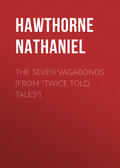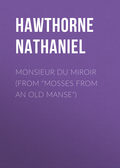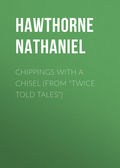
Натаниель Готорн
A Book of Autographs
From good old Baron Steuben, we find, not a manuscript essay on the method of arranging a battle, but a commercial draft, in a small, neat hand, as plain as print, elegant without flourish, except a very complicated one on the signature. On the whole, the specimen is sufficiently characteristic, as well of the Baron's soldier-like and German simplicity, as of the polish of the Great Frederick's aide-de-camp, a man of courts and of the world. How singular and picturesque an effect is produced, in the array of our Revolutionary army, by the intermingling of these titled personages from the Continent of Europe, with feudal associations clinging about them, – Steuben, De Kalb, Pulaski, Lafayette! – the German veteran, who had written from one famous battle-field to another for thirty years; and the young French noble, who had come hither, though yet unconscious of his high office, to light the torch that should set fire to the antiquated trumpery of his native institutions. Among these autographs, there is one from Lafayette, written long after our Revolution, but while that of his own country was in full progress. The note is merely as follows: "Enclosed you will find, my dear Sir, two tickets for the sittings of this day. One part of the debate will be on the Honors of the Pantheon, agreeably to what has been decreed by the Constitutional Assembly."
It is a pleasant and comfortable thought, that we have no such classic folly as is here indicated, to lay to the charge of our Revolutionary fathers. Both in their acts, and in the drapery of those acts, they were true to their several and simple selves, and thus left nothing behind them for a fastidious taste to sneer at. But it must be considered that our Revolution did not, like that of France, go so deep as to disturb the common-sense of the country.
General Schuyler writes a letter, under date of February 22, 1780, relating not to military affairs, from which the prejudices of his countrymen had almost disconnected him, but to the Salt Springs of Onondaga. The expression is peculiarly direct, and the hand that of a man of business, free and flowing. The uncertainty, the vague, hearsay evidence respecting these springs, then gushing into dim daylight beneath the shadow of a remote wilderness, is such as might now be quoted in reference to the quality of the water that supplies the fountains of the Nile. The following sentence shows us an Indian woman and her son, practising their simple process in the manufacture of salt, at a fire of wind-strewn boughs, the flame of which gleams duskily through the arches of the forest: "From a variety of information, I find the smallest quantity made by a squaw, with the assistance of one boy, with a kettle of about ten gallons' capacity, is half a bushel per day; the greatest with the same kettle, about two bushels." It is particularly interesting to find out anything as to the embryo, yet stationary arts of life among the red people, their manufactures, their agriculture, their domestic labors. It is partly the lack of this knowledge – the possession of which would establish a ground of sympathy on the part of civilized men – that makes the Indian race so shadow-like and unreal to our conception.
We could not select a greater contrast to the upright and unselfish patriot whom we have just spoken of, than the traitor Arnold, from whom there is a brief note, dated, "Crown Point, January 19, 1775," addressed to an officer under his command. The three lines of which it consists can prove bad spelling, erroneous grammar, and misplaced and superfluous punctuation; but, with all this complication of iniquity, the ruffian General contrives to express his meaning as briefly and clearly as if the rules of correct composition had been ever so scrupulously observed. This autograph, impressed with the foulest name in our history, has somewhat of the interest that would attach to a document on which a fiend-devoted wretch had signed away his salvation. But there was not substance enough in the man – a mere cross between the bull-dog and the fox – to justify much feeling of any sort about him personally. The interest, such as it is, attaches but little to the man, and far more to the circumstances amid which he acted, rendering the villainy almost sublime, which, exercised in petty affairs, would only have been vulgar.
We turn another leaf, and find a memorial of Hamilton. It is but a letter of introduction, addressed to Governor Jay in favor of Mr. Davies, of Kentucky; but it gives an impression of high breeding and courtesy, as little to be mistaken as if we could see the writer's manner and hear his cultivated accents, while personally making one gentleman known to another. There is likewise a rare vigor of expression and pregnancy of meaning, such as only a man of habitual energy of thought could have conveyed into so commonplace a thing as an introductory letter. This autograph is a graceful one, with an easy and picturesque flourish beneath the signature, symbolical of a courteous bow at the conclusion of the social ceremony so admirably performed. Hamilton might well be the leader and idol of the Federalists; for he was pre-eminent in all the high qualities that characterized the great men of that party, and which should make even a Democrat feel proud that his country had produced such a noble old band of aristocrats; and he shared all the distrust of the people, which so inevitably and so righteously brought about their ruin. With his autograph we associate that of another Federalist, his friend in life; a man far narrower than Hamilton, but endowed with a native vigor, that caused many partisans to grapple to him for support; upright, sternly inflexible, and of a simplicity of manner that might have befitted the sturdiest republican among us. In our boyhood we used to see a thin, severe figure of an ancient mail, timeworn, but apparently indestructible, moving with a step of vigorous decay along the street, and knew him as "Old Tim Pickering."
Side by side, too, with the autograph of Hamilton, we would place one from the hand that shed his blood. It is a few lines of Aaron Burr, written in 1823; when all his ambitious schemes, whatever they once were, had been so long shattered that even the fragments had crumbled away, leaving him to exert his withered energies on petty law cases, to one of which the present note refers. The hand is a little tremulous with age, yet small and fastidiously elegant, as became a man who was in the habit of writing billet-doux on scented note-paper, as well as documents of war and state. This is to us a deeply interesting autograph. Remembering what has been said of the power of Burr's personal influence, his art to tempt men, his might to subdue them, and the fascination that enabled him, though cold at heart, to win the love of woman, we gaze at this production of his pen as into his own inscrutable eyes, seeking for the mystery of his nature. How singular that a character imperfect, ruined, blasted, as this man's was, excites a stronger interest than if it had reached the highest earthly perfection of which its original elements would admit! It is by the diabolical part of Burr's character that he produces his effect on the imagination. Had he been a better man, we doubt, after all, whether the present age would not already have suffered him to wax dusty, and fade out of sight, among the mere respectable mediocrities of his own epoch. But, certainly, he was a strange, wild offshoot to have sprung from the united stock of those two singular Christians, President Burr of Princeton College, and Jonathan Edwards!







